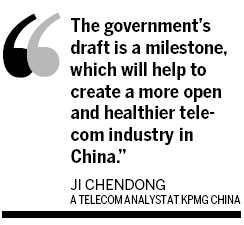Telecom plans 'will help break' industry monopoly
China plans to conduct a pilot project for domestic private companies to offer repackaged mobile services to users, which analysts said would be a decisive step in the opening of the nation's basic telecom service market.
The Ministry of Industry and Information Technology has published draft proposals on allowing Chinese private companies to buy mobile network resources from three telecom operators.
The proposed two-year trial allows private enterprises to rebrand the mobile services and sell them to customers.
The ministry issued the draft on Tuesday and is seeking public feedback until Feb 6.
"The ministry aims to encourage, support and guide private capital flowing into the telecom industry," said the draft.
It also pointed out the trial project seeks to explore effective models and form regulatory policies to boost competition and service quality in China's mobile market.
Companies that are interested in participating should send applications to the telecom authorities during the first year of the project, the draft said.
Existing Chinese telecom operators, including China Mobile Ltd and China Unicom (Hong Kong) Ltd, have to cooperate with at least two private companies each during the trial period.

China has long been discussing opening its basic telecom service market, which contains businesses such as telecom network operations, call services and broadband connections. However, State-owned telecom carriers still have a tight hold on the market. Private companies and foreign enterprises conduct limited business focusing on value-added telecom services.
"The government's draft is a milestone, which will help to create a more open and healthier telecom industry in China," said Ji Chendong, a telecom analyst at KPMG China. The move breaches China's current telecom monopoly and will allow non-State-owned companies to become virtual network operators, Ji said.
"Virtual network operators do not own their own networks. They rent infrastructure resources from telecom operators."
A number of companies, including Internet firms such as Tencent Holdings Ltd and mobile device manufacturers like Huawei Technologies Co Ltd, may join in the pilot project to optimize their services and grab a bigger slice of the market.
"I expect the Chinese government to officially issue virtual network operator licenses by June this year," Ji said.
In developed economies such as the United States and Japan, virtual network operators have legally existed for a long time. Their participation diversifies products and services, and helps lower customers' costs.
Chen Min, a telecom industry observer based in Beijing, said if private companies enter the telecom industry as virtual network operators, the telecom monopoly might start disappearing. "Telecom operators' current businesses may be under pressure, but on the other hand, emerging virtual network operators may also introduce new revenues to them," she said.
Li Yizhong, a former minister of industry and information technology, said last year the opening of China's basic telecom service market is an inevitable trend, but the government should complete the task step by step.
High-level management at China Mobile and China Unicom have previously told China Daily they welcome competition and will fulfill their responsibilities to create an open industry.
Zhang Feng, head of the communication development division of the Ministry of Industry and Information Technology, said China will open the telecom market, including allowing private capital into the areas with the most rapid growth rate, Web portal Netease reported.
shenjingting@chinadaily.com.cn
(China Daily 01/09/2013 page14)








